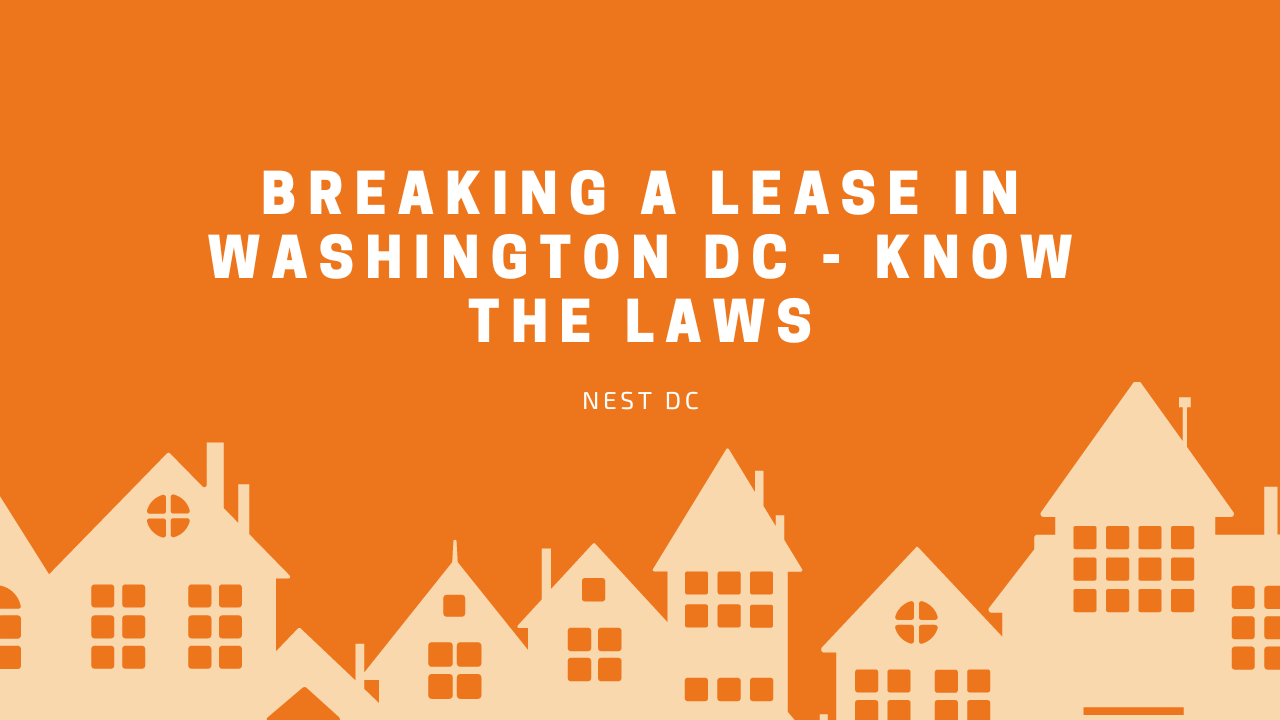Breaking a Lease in Washington DC - Know the Laws
Nest DC

As a housing provider in Washington, DC, it’s crucial to understand the complexities of breaking a lease agreement. This article will discuss when breaking a lease is and isn’t legally justified and provide you with insights into your rights as a lessor of a rental unit.
Rental Agreements in Washington DC
Having a clear lease agreement is essential. When your tenant signs their agreement, it is your responsibility as a housing provider to ensure they are aware of penalties they may face for breaking a lease early.
Your rental agreement should also include how much notice a tenant must give you when ending their lease in Washington, DC. In Washington, DC, your tenant must give you the following notice:
- Month to Month Lease- 30 days' notice
- Fixed Term Lease- 30 days’ notice unless otherwise specified in the lease agreement
Unjustified Reasons to Break a Lease in Washington DC
As a housing provider in Washington, DC, you’ll need to know when residents do and do not have a legally justified reason to break their lease. Knowing Washington DC’s Landlord-Tenant Laws can provide clarity when handling agreements and tenant interactions.

When tenants break leases early, they can still face penalties or have to pay rent for the remainder of their original agreement if they choose to move for the following reasons.
- Home Purchase: A tenant’s decision to buy a home doesn't grant them the right to break their lease of the rental unit.
- Career or Academic Shift: A tenant's decision to relocate due to a new job opportunity or academic pursuit doesn't provide a legal ground for lease termination.
- Desire for an Upgrade or Downgrade: A tenant's wish to upgrade or downgrade their living situation isn't a legal reason to end their lease early.
- Cohabitation with a Partner: As important as this life step might be, moving in with a partner doesn't automatically justify lease termination.
- Proximity to Family: A tenant's decision to move closer to family is not typically a legally justified reason to break a lease.
While these scenarios generally aren't legally justified reasons to break a lease, keep in mind that open communication and mutual understanding can often lead to amicable solutions for you and your tenants. Especially if your tenants are experiencing a hardship or you have some flexibility, considering a mutual termination and moving onto finding a new tenant may be the best choice.
Justified Reasons to Break a Lease in Washington DC
As a housing provider in Washington, DC, you must know when a tenant can legally break their lease before the end of the lease term without penalties. Below, you will find justified reasons for the termination of a lease term:
Early Termination Clause
Agreements have evolved over time, and many now include
clauses with specific conditions that permit an early lease termination. When creating a lease, add in clauses for the tenant that clearly outline the agreed-upon procedure to handle rent and the security deposit when prematurely ending the lease term.

These clauses usually involve a penalty fee and a required notice period for the tenant. However, it's crucial to consider other stipulations that could potentially alleviate this penalty.
Active Military Duty
The Servicemembers Civil Relief Act (SCRA) safeguards those in active military and foreign service. If your tenant is deployed or receives a permanent change of station, this law permits them to end their lease without penalties, provided they meet the following criteria:
The lease was signed by the tenant before they entered active duty.
Active duty status will be maintained for at least 90 days.
Written notice of deployment or PCS has been given, along with supporting documents.
Please note that the termination doesn't take effect immediately. It can only end 30 days after the beginning of the next rent period. Rent may still be collected for the intervening period.
Standards of Habitability
Washington, DC, is dedicated to its residents' well-being. If a rental unit doesn't meet specific health and safety standards and timely repairs aren't made, the tenant may legally terminate the tenancy without penalties under a principle known as "constructive eviction." Constructive evictions are not the same as standard evictions per DC’s eviction laws.
In DC, housing provider obligations include maintaining common areas, providing adequate heat, window screens, pest control, and overall maintenance during the tenancy.
Privacy Violation
Privacy is crucial for a tenant. Housing providers in DC must give at least 48 hours' notification before entering a rental unit for non-emergency repairs. If a lessor changes the locks or removes doors and windows, it could lead to a "constructive eviction" scenario, allowing the tenant to break their lease early.
Domestic Violence
Washington, DC, law provides essential
protections for victims of domestic violence. In such cases, tenants can present written notice and proof of their situation to terminate their lease early. DC law also allows tenants to request a lock change for their safety.

In a domestic violence scenario, housing providers should respect the tenant’s privacy, acknowledge their situation, abide by relevant laws, and cooperate with law enforcement. Housing providers must maintain confidentiality and ensure the safety of the affected tenant, even if this means allowing early lease termination.
Conclusion
Knowing about landlord-tenant laws, from lease breaking and evictions to fair housing and security deposits, is crucial to your success as a housing provider. As an expert management company in the District, we at Nest DC pride ourselves on the wealth of experience we've garnered over the years.
For more insights or to start a conversation about your management needs, give us a call today at (202) 540-8038. Your success in real estate investing is our priority. We look forward to hearing from you soon!
Disclaimer: Please note that the information provided in this blog is intended for general guidance and should not be considered a replacement for professional legal advice. It is important to be aware that laws pertaining to rental management may change, rendering this information outdated by the time you read it.









